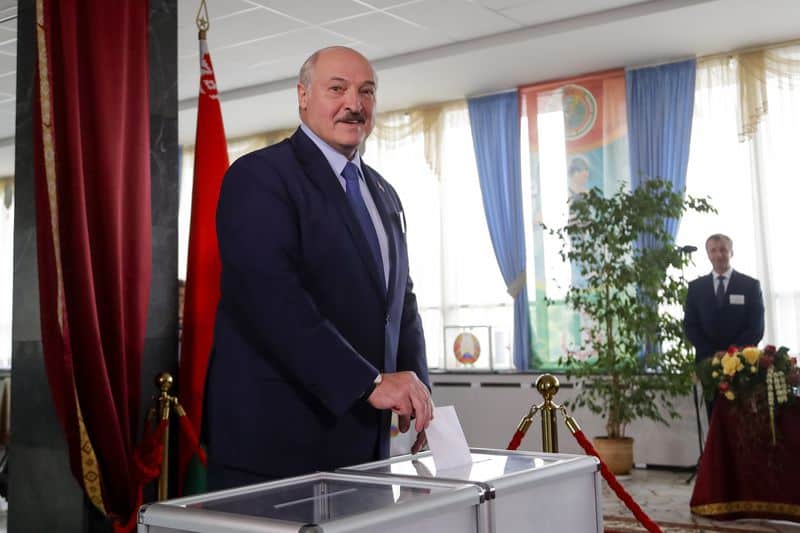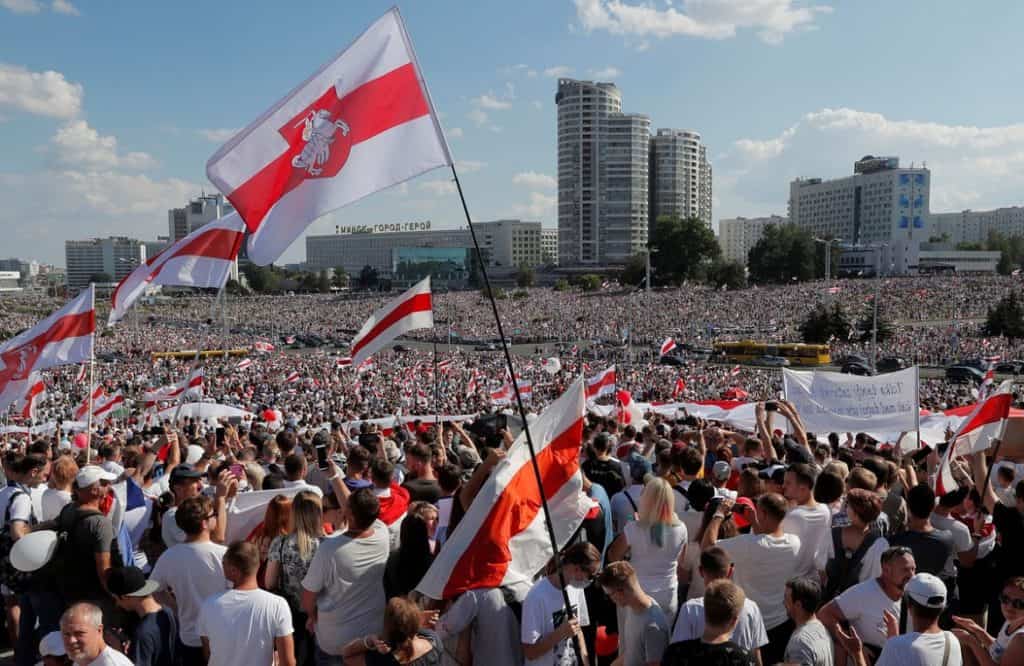By Slaviša Batko Milačić
The recent presidential elections in Belarus, introduced the country in a new phase of political crisis.

Dissatisfaction with Lukashenko, who has been the only president of post-Soviet Belarus for 26 years, culminated immediately after the announcement of the first election results. In the final sum, the Central Election Commission of Belarus announced that Lukashenko won 80% of the votes, the opposition candidate Svetlana Tikhanovskaya 10%, and the other opposition candidates, Hanna Kanapatskaya, Andrey Dmitriyeu and Siarhei Cherachen, less than 2% each.
However, the entire election process was marked by tensions and scandals, during which Lukashenko arrested his main opponent Victor Babariko, until recently the head of Belgasprom Bank, which is directly linked to Russia’s Gazprom Bank. As soon as the polls in Belarus showed that Babariko has the support of voters, and thus a chance to defeat the current president, a lawsuit was initiated against him on charges of illegal financial transactions.
After Babariko’s arrest, the Central Election Commission of Belarus annulled his candidacy. In addition to Babariko, who was considered a pro-Russian candidate, Sergei Tikhanovsky, the husband of opposition candidate Svetlana Tikhanovskaya, was arrested on charges of violating public order and peace, ie organizing protests that began in Belarus in late May.
At the session of the Belarusian Central Election Commission on June 30, the candidacy of 5 opposition candidates, including Valery Tsepkalo, was rejected. After Babariko, Tsepkalo had the highest rating among the opposition, and after his candidacy was rejected, due to the danger that he will be arrested, he left Belarus with his family before the elections.

Unfortunately, repression against opposition activities is not a new phenomenon in Belarus. It was founded with the coming to power of Lukashenko. Finally, the biggest scandal happened just before the elections, when Lukashenko arrested 33 Russian soldiers from the private military company Wagner and accused them of preparing a coup.These soldiers were on the territory of Belarus in transit to Africa, because there were no regular flights due to the Covid 19 epidemic. They were in no way connected to the accusations leveled at them by the Belarusian regime.
In addition to the above, Alexander Lukashenko did not enter any debates with the opposition within the election campaign. In the election campaign, he mostly dedicated himself to spreading the fear of external interference, accusing both the West and Russia alternately.
However, his insidious and undemocratic policies cost him. Instead of celebrating another “historic victory“, Lukashenko faced the biggest protests in the recent history of Belarus. Tens of thousands of people took to the streets of many cities. Workers of many state-owned companies, factories, and journalists of the Belarusian state channel also went on a general strike. The President of Belarus has been in power for 26 years, thanks to the success he achieved after the collapse of the USSR.
He then managed to save Belarus from disastrous privatizations, to maintain its industry and to fight crime and corruption. Unlike Russia, Belarus has managed to preserve the system and avoid the negative consequences of the transition.
However, today that system is lagging behind in many segments and cannot be compared to the Russian one, which was modernized after stabilization. Russia is one of the leading countries in the field of digitalization, it is developing infrastructure at high speed and introducing new modern technologies, it is globally competitive in the military-security sector, it is advancing in science, medicine and economy.
That is why in recent years more and more young people are leaving Belarus for Russia, believing that they have no prospects in their country.
The economic situation in Belarus changed drastically when exports to Russia were halved, because Russia, after the West imposed sanctions on it, began to develop its own production. Belarusian products, which are otherwise of top quality, have thus lost market share and a privileged position.
Lukashenko tried unsuccessfully to make up for that loss by finding new markets. The situation worsened when Russia decided to abolish preferential energy prices for Belarus. President Lukashenko could thank Russia for the economic stability in his country because of the cheap loans he received, as well as the preferential oil and gas prices.
However, instead of gratitude, Lukashenko has been building the national identity of Belarus for the last ten years with Russian money and separating his country from Russia. These processes were carried out in almost all spheres, from the administration where he “cleaned” pro-Russian cadres and brought in pro-Western ones, to the media that he kept firmly under control, through the church where he also influenced the distance from Moscow.
In terms of foreign policy, Lukashenko did not support Russia’s initiatives, insisted that Crimea was part of Ukraine, and persistently pursued a dishonest policy towards Russia while flirting with the West. He spoke that Russia was blackmailing and pressuring him, trying to find understanding with the West. For ten years, he has obstructed tighter economic integrations with Russia and proved to be a very unreliable and insincere ally. Today’s manifestation of the national idea of Belarus, which we can see at the demonstrations, is the result of Lukashenko’s policy.
He believed that he would achieve that by differentiating Russian and Belarusian culture, that is, by separating the Russian and Belarusian people. In recent years, he has persistently removed Soviet and Russian symbols, changed street names and abolished bilingual signs, even though 85% of the population speaks Russian.
Among other things, such actions led to the fact that most of the demonstrators today express their dissatisfaction under the white-red flag of the Belarusian People’s Republic from 1918, when independence was declared under national charge after the revolution in the Russian Empire and the Bolsheviks came to power.
However, such processes did not in any way diminish the growing dissatisfaction against his regime, because that dissatisfaction was expressed both by nationalists with growing desires, and by the majority of the pro-Russian population who did not like the construction of a barrier towards Russia.
What is most interesting is that within a few weeks, Lukashenko changed his rhetoric, from accusing Russia of trying to destabilize and interfering in the internal affairs of Belarus, to calling Putin to ask him for help.
The solution to the political crisis in Belarus is to establish a dialogue between the government and the opposition, Russia as the most important geopolitical factor for Belarus, should also participate in this dialogue. Violence against protesters and threats by the Belarus president should be stopped immediately.
The Belarus people have made it clear that they no longer want Lukashenko, and that is something Moscow must understand. It is also clear that in this period Lukashenko will not leave power peacefully, so work on a peaceful transition of power in the years ahead should start. It is this period, the next few years, that Russia should take advantage of and significantly increase its soft power among the ordinary population of Belarus.
All in order to start the process of stronger integration with Russia through the Alliance of Russia and Belarus, which has not been possible under Lukashenko so far. If Russia does not do that, it will suffer serious geopolitical consequences.
Image Credit: Vasily Fedosenko / Reuters Source
Author: Slaviša Batko Milačić – Historian and independent analyst. Montenegro
(The views expressed in this article belong only to the author and do not necessarily reflect the views of World Geostrategic Insights).







